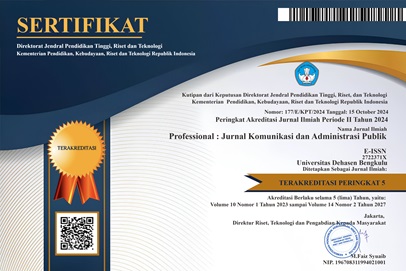STRATEGI KOMUNIKASI KELOMPOK PADA IKATAN DUTA BAHASA DALAM PROGRAM KERJA “PERLU GALAKSIS”
Abstract
The purpose of this research is to know and describe the group communication strategy that is carried out by the ambassadors of language ties in the work program which is "perlu galaksis". The approach of this research is a descriptive qualitative approach. In this study using Diffusion of Innovation theory. In this study researchers used principal informants and expert informants based on Purposive Sampling techniques. Data collection techniques are carried out by observation, in-depth interviews, documentation and literature. Data analysis techniques are done by reducing data, presenting data and drawing conclusions. In this study using the data validity test by triangulation technique. The results of this study indicate that: (1) The group communication strategy carried out by the language ambassadors in the work program "perlu galaksis" is to coordinate with the ambassadors, the language office and the Bengkulu City Elementary School 67, using persuasive communication while teaching and using Ludo's media as a new innovation media that was first applied in Bengkulu Province. (2) In the work program perlu galaksis supporting factors, namely the full support from the office, SD N 67 who are welcome with ambassadors' ties, good coordination and many teaching staff. In addition there are inhibiting factors, namely the lack of teaching experience, unruly classroom management and the unstable spirit of children. (3) Work programs "perlu galaksis" can be well received and successfully implemented as evidenced by the increase in children's understanding.





